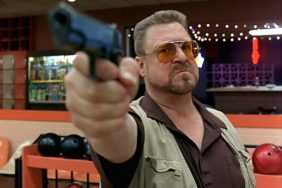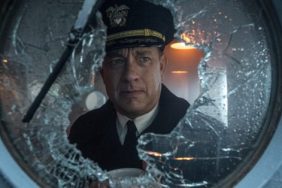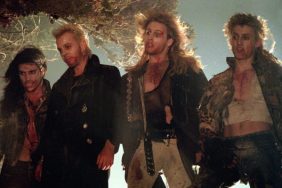English author G.K. Chestertron once wrote that “The true soldier fights not because he hates what is in front of him, but because he loves what is behind him.” It is a mentality that leads many, even those who don’t necessarily support a particular military conflict, to support the military itself. The people who dedicate their lives to protecting their country and its values are a special breed, asked and able to perform impossible tasks, and overcome overwhelming odds, for people they leave behind. They make sacrifices so that the other citizens of their country do not have to.
In this special edition of The Best Movie Ever , we asked our resident film critics – William Bibbiani, Witney Seibold and Ashely Robinson – to present their picks for the best film ever to represent the military, whatever that might mean to them. Their picks run a gamut of multiple wars, but the similarities bind them: hard times, painful obstacles, lessons – often difficult lessons – learned.
Read more about their selections, and let us know your own favorites.
Witney Seibold’s Pick: Full Metal Jacket (1987)

I’ve heard both arguments. Some (like François Truffaut) say that every film about war is necessarily pro-war because combat, with its fast action, exciting violence, natural drama, life-or-death stakes, and emotional immediacy, is inherently cinematic. I’ve also heard that every film about war is inherently anti-war because, when one takes a cinematic look at the violence, political motives, and horror of combat, one can truly appreciate the futility of the war effort. War pictures are certainly of a genre that is often at, well, war with itself. The anti-war films can often be argued as pro-war films and, more often, vice versa . Tom Brook wrote a great essay on this topic for the BBC a few years back.
If one is a dyed-in-the-wool pacifist, one may be personally and naturally drawn to films that condemn war in general, and depict combat as a horrible experience. You may also find yourself falling into the camps of numerous filmmakers who return to wartime plight again and again. And no filmmaker was able to explore the depth and breadth of wartime horror better than Stanley Kubrick. And no film of his was better at pointing out the utter lunacy of the soldierly experience than Full Metal Jacket .
Also: The Greatest War Stories in Video Games
After pointing out the bureaucratic futility of war in Paths of Glory and Dr. Strangelove , Kubrick turned to the soldiers themselves in 1987, creating a damning litany of events that lead to, essentially, the American soldier losing their very humanity. The first half of Full Metal Jacket is all about basic training, which, as we explore, is less about learning skills valuable in the field, and more about the torture chamber of humiliation that soldiers must suffer so that their humanity can be replaced with death instincts. The second half of the film is a shapeless dark meandering through actual combat, when profound things happen, and the soldiers struggle to feel anything at all.
That Kubrick should attach that loss of soul to the Vietnam war is particularly damning. War was always futile in his mind, but after this particular war, Kubrick seemed to argue, there was no going back. Full Metal Jacke t is one of the best films about soldiers, and is quite easily one of the best films of the 1980s.
William Bibbiani’s Pick: Black Hawk Down (2001)

There is a reason, I think, why we make subtle distinctions between certain films. For example, there are “war movies,” and then there are movies about the military. A movie about the military need never make it as far as the battlefield to explore its topic. A war movie must by necessity be about the war, but a movie about the military simply must focus on the soldiers themselves, and what service in the armed forces does to their lives, their philosophies, and their relationships.
So although Ridley Scott’s Black Hawk Down doesn’t exactly dwell on the politics or moral quandaries of its particular, real-life battle, it does seem to make a convincing argument that it’s the greatest movie ever made about the military itself. In the film, an ill-fated mission into Mogadishu, Somalia results in a catastrophic helicopter crash, and a large group of soldiers trapped in the middle of a firefight. The mission they were on becomes an immediate afterthought, the survival and retrieval of the trapped soldiers takes priority. And every soldier risks their lives in the process, risking the many to save the few, because that is the overwhelming extent of their loyalty to one another… regardless of their politics.
Ridley Scott’s “you are there” cinematography and editing, and his eardrum-rupturing sound design, convey the intensity of the firefight. His tendency to luxuriate in set dressing creates an environment in which the structured, organized military is comfortable, and another in which they are desperately trying to inch towards safety. Again, the politics of warfare and the morality (or lack thereof) behind it are, have been, and will forever be questionable. But once you’re in the thick of it, all that matters is the person next to you, because you’re all that matters to them.
Ashley V. Robinson’s Pick: Passchendaele (2008)

As the daughter of a Canadian officer and now the wife of a former American soldier, I think I might be looking for different things in military movies than other people. Black Hawk Down was going to be my original choice, which I still believe deserves much celebration for the accuracy and heart it shows, but I ultimately went with an independent Canadian film starring Paul Gross.
By contemporary standard the First World War – the war to end all wars – has been largely left to the annals of history and fading memory. The current Wonder Woman movie has returned it somewhat to the public consciousness on the 100th anniversary of many of the battles that changed the face of modern warfare. Passchendaele focuses on one of the last and most vicious battles that Canadian forces undertook, through the lens of Sergeant Michael Dunne (Gross). He returns home after a long tour of duty and slowly begins to put a new life together. However, when David Mann (played by Joe Dinicol), the younger brother of the woman Dunne has fallen in love with, manages to enlist despite his asthma and get shipped to the theatre of war, Sergeant Dunne reenlists under his mother’s maiden name in order to protect him. Unfortunately for both, they wind up at the bloody battle of Passchendaele and not everyone makes it out alive.
The plot might be considered fairly straight forward, but in my opinion, the best military movies speak to the shared bond between those who serve while highlighting the insane circumstances they were faced with. Passchendaele does both deftly without coming off as too preachy on any account. The fact that it was not made by a giant Hollywood movie studio often leads to tight, claustrophobic shots focused clearly on what a singly character is doing and leaving the imagination to decide what is going on everywhere else. Passchendaele is artfully done, evocative and holds the unique position of maybe being able to teach mainstream audiences something about World War I that they didn’t know before.










